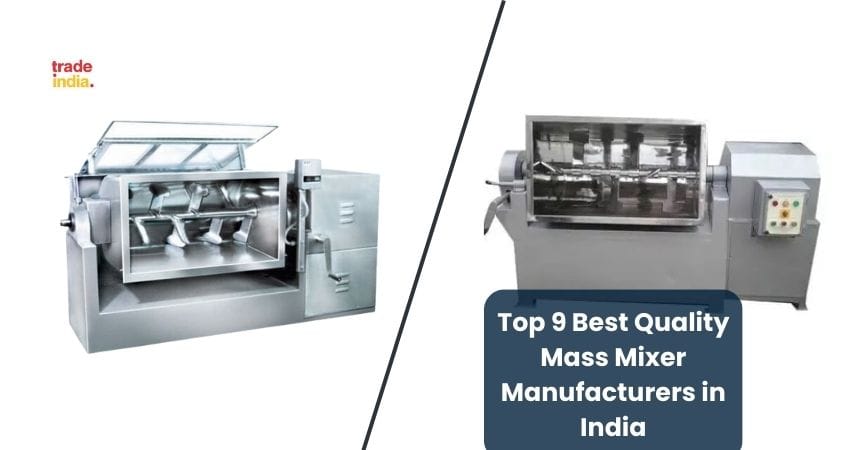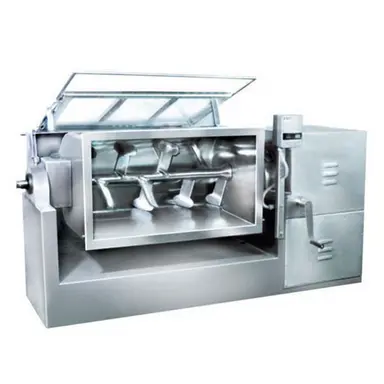Top 9 Mass Mixer Manufacturers & Dealers in India

Mass Mixer
Innovation is the foundation of advancement in the constantly changing world of industrial manufacturing. The mass mixer is one such invention that has profoundly revolutionized a number of industries. This adaptable machine has developed into a crucial instrument for blending and homogenizing a broad range of ingredients, contributing significantly to the uniformity and quality of the final result. We'll take a voyage through the world of mass mixers in this blog, learning about their characteristics, uses, and the profound influence they've had on modern industrial procedures.
A mass mixer is fundamentally an engineering wonder made to efficiently combine and homogenize materials on a big scale. This procedure is essential for establishing consistency and the desired characteristics of the finished product. Mass mixers have established themselves in a variety of sectors, including the pharmaceutical, chemical, food processing, cosmetic, and other industries.
The development of mass mixers as a key component of industrial blending exemplifies the advancements made possible by human ingenuity. Multiple industries have been altered by their capacity to produce homogeneous mixes at scale, improving manufacturing efficiency and raising product quality. These devices have solidified their status as essential instruments that simplify production processes, rethink quality standards, and spur innovation in the search of a more productive and environmentally friendly industrial future across a variety of industries, from medicines to cosmetics.
Applications of Pharmaceuticals
Pharmaceuticals: In this sector, precision is paramount. Mass mixers play a vital role in blending active pharmaceutical ingredients (APIs) with excipients to create uniform drug formulations with consistent dosage and efficacy.
Food Processing: The food industry relies on mass mixers to ensure uniform flavor dispersion and texture in products like sauces, seasonings, and baked goods, guaranteeing a delightful culinary experience.
Chemical Manufacturing: Mass mixers help combine substances of different viscosities, guarantee homogeneity, and preserve product integrity while producing speciality chemicals or bulk items.
Cosmetics and personal care: From lotions and creams to shampoos and fragrances, mass mixers help cosmetic items have uniform textures and looks.
How it creates impact on Modern Manufacturing
Efficiency Boost: Mass mixers greatly speed up the mixing process, minimizing manual labor and cutting down on manufacturing time, which results in increased overall efficiency.
Consistency Assurance: In many sectors, achieving consistent combinations is essential. Mass mixers minimize variances and guarantee product quality by ensuring that every batch adheres to exact specifications.
Waste Reduction: By optimizing mixing procedures and minimizing material wastage, mass mixers contribute to cost savings and sustainable manufacturing practices.
Adaptability: Mass mixers are versatile tools that can be tailored to handle diverse materials and meet specific requirements, offering flexibility in catering to varying industrial needs.
Top 9 Mass Mixer Manufacturers & Dealers in India
Mass mixers are positioned to develop further as technology progresses, incorporating features that increase accuracy, automation, and personalization. As mass mixers continue to push innovation across industries and adapt to changing needs, their influence on changing industrial practices is expected to grow. Below is the list of top 9 Mass Mixer Manufacturers & Dealers in India:
Cadmach Machinery Co., Ltd.:
It is known for its revolutionary pharmaceutical gear, offers a variety of mass mixers for a variety of sectors. Their dedication to precision and adherence to international standards makes them an excellent choice.
Prism Pharma Machinery:
Specializing in pharmaceutical machinery, it offers sophisticated features like as GMP compliance and user-friendly controls to the pharmaceutical, chemical, and cosmetic industries.
Fluidpack:
It is extensively applied for pharmaceutical packaging and processing equipment, offers mass mixers engineered for effective size reduction and uniform material mixing. Their solutions are useful in a variety of sectors.
SaintyCo:
A global provider of pharmaceutical equipment, it offers mass mixers designed to enhance manufacturing processes and meet regulatory criteria. Their solutions are adaptable to diverse industries.
Saimach Pharma:
It manufactures flexible mass mixers for the pharmaceutical, chemical, and cosmetic industries. Their emphasis on accuracy, sanitation, and simplicity of use makes them a trustworthy option.
Nu Pharma Engineers & Consultant:
This organization specializes in delivering pharmaceutical sector mass mixers. Their services emphasize quick switching, safety, and little maintenance.
GMP Equipments Pvt. Ltd.:
With an emphasis on pharmaceutical equipment, it creates mass mixers that allow for efficient and regulated processing while upholding high quality standards.
Shakti Pharmatech Pvt. Ltd.:
It manufactures mass mixers and other pharmaceutical equipment, hence improving manufacturing processes and ensuring consistent quality in a variety of sectors.
Mittal Engineering Works:
Manufacturing pharmaceutical and chemical equipment, it provides accurate and adaptable mass mixers that help companies achieve high-quality output.
FAQ's: Mass mixer
Q. What is a mass mixer, and what is its primary function?
Ans. A mass mixer is a specialised industrial equipment intended for mixing and blending massive volumes of dry or wet materials. It is widely used in a variety of sectors, including medicines, chemicals, food processing, cosmetics, and others. A mass mixer's principal job is to guarantee that diverse components within a mixture are distributed uniformly, resulting in a homogeneous product with consistent features and characteristics.
A mass mixer's main function is to thoroughly and evenly combine diverse materials, which can range from powders, granules, and particles to cohesive compounds. Mass mixers assist the development of consistent mixes that fulfill certain quality standards and needs specified by the industry by utilizing various types of mixing devices such as blades, paddles, and agitators.
Mass mixers are used in the pharmaceutical industry, for example, to blend active pharmaceutical ingredients (APIs) with excipients, ensuring that each dosage form (such as tablets or capsules) includes an equal distribution of components. Similarly, bulk mixers aid in the creation of uniform textures, flavours, and appearances in items such as sauces, spices, and baked goods.
Overall, a mass mixer's major role is to simplify the mixing and blending process, lowering the possibility of segregation, improving product quality, and guaranteeing that the finished product satisfies the specified requirements and standards.
Q. How does a mass mixer work in the pharmaceutical or chemical industry?
Ans. Mass mixers are essential in the pharmaceutical and chemical industries for assuring the consistent mixing of diverse materials to make homogeneous mixes. These mixers use a variety of processes to ensure complete mixing while preserving product uniformity and quality. In various industries, a mass mixer functions as follows:
- Loading Ingredients
- Selection of Mixer Type
- Mixing Mechanism
- Agitation and Movement
- Time and Speed Control
- Discharge and Collection
- Cleaning and Maintenance
- Repeatable Process
The precision and uniformity of mixes are crucial in the pharmaceutical and chemical industries to the effectiveness and safety of the final products. Mass mixers are intended to meet these requirements by delivering regulated and consistent mixing that complies with industry laws and quality standards.
Q. What are the common uses and industries that utilize mass mixers?
Ans. The ability to assure homogeneous material mixing, mass mixers are widely used in a variety of sectors. The following are some of the most prevalent applications and industries that make use of mass mixers:
Pharmaceutical Industry: Mass mixers are extensively used in pharmaceuticals for blending active pharmaceutical ingredients (APIs) with excipients to create uniform drug formulations. This ensures consistent dosing and efficacy in tablets, capsules, and other dosage forms.
Chemical Industry: Chemical manufacturers rely on mass mixers to homogeneously blend various chemical compounds, ensuring uniform distribution and properties in products ranging from specialty chemicals to bulk materials.
Food Processing: Mass mixers are used in the food business to provide uniform textures, flavours, and appearances in items such as sauces, spices, seasonings, and baked goods.
Cosmetics and personal care goods: Mass mixers are used to combine materials in cosmetic and personal care products, assuring consistency in creams, lotions, shampoos, and other beauty products.
Plastics and polymers: In the plastics and polymer industries, mass mixers are used to blend diverse polymer components and additives, guaranteeing equal dispersion and consistent material characteristics.
Mass mixers' numerous uses in different sectors highlight their relevance in ensuring product consistency, quality, and uniformity. Their involvement in ensuring accurate material blending has a substantial influence on the overall performance and attributes of the finished goods.
Q. What types of materials can be mixed using a mass mixer?
Ans. A mass mixer is a multipurpose industrial equipment that can combine both dry and moist materials. A mass mixer can be used to combine the following materials:
- Powders
- Granules
- Particles
- Tablets and Capsules
- Liquids and Suspensions
- Flavors and Fragrances
- Adhesives and Sealants
- Dyes and Pigments
- Solid-Liquid Blends
- Herbs and Spices
- Ceramic Powders
- Metal Powders
- Metal Powders
The versatility of mass mixers makes them suitable for a wide array of industries and materials, contributing to the creation of uniform mixtures that meet quality standards and regulatory requirements.
Q. Are there different types and sizes of mass mixers available?
Ans. Yes, numerous types and sizes of mass mixers are available to meet the needs of diverse industries and mixing requirements. Mass mixers are built with various mechanics and capacities to suit a variety of applications. Here are some examples of popular mass mixer kinds and sizes:
Types of Mass Mixers:
- Ribbon Blenders: A ribbon-like agitator in these mixers pushes ingredients both radially and laterally, ensuring complete mixing. Ribbon blenders can be used to combine powders, granules, and dry materials.
- Paddle Mixers: Paddle mixers use paddles or blades to transport materials in a circular or radial motion. These mixers are suited for wet and dry mixing of solid materials.
- High-Shear Mixers: High-shear mixers are intended for rapid mixing and particle size reduction. They are often employed in sectors that demand fine and homogenous mixes.
- Ploughshare Mixers: Ploughshare mixers drive materials along the mixing chamber with plough-shaped agitators, ensuring complete blending and preventing material build-up.
EXPLORE MORE:

